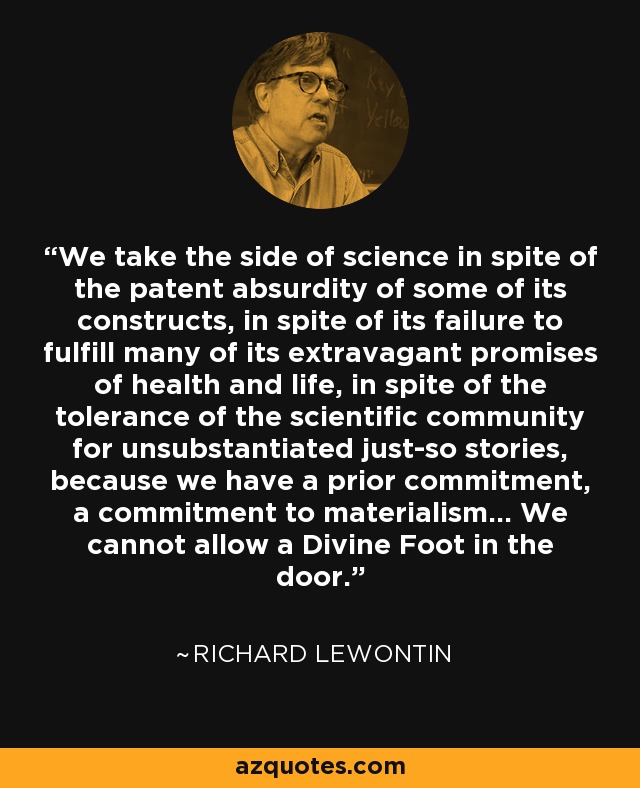@Frank Apisa,
Hmmm. Let's look at that again...
Jiggy wrote:Considering though, that there are some things science cannot explore, due to its limitations, should we restrict our knowledge by rejecting evidence?
Say for example, some phenomenon occurred that cannot be explained by any natural means - a miracle, if you will. Science does not have the answer, but religion does. Should we decide to deny that evidence, because scientists cannot interpret it to fit their naturalistic worldview?
Frank wrote:So you are suggesting that when we come upon matters that "science" cannot explain....it makes more sense to call them acts of a GOD...
...than to simply say, "We do not know the answer to that question yet...and may never know?"
Wow. Those quotes look so completely opposite... like sunrise and sunset; North pole and South pole.
No wonder it makes no sense Frank. You created it, and I don't know why.
I know that it is a usual strawman Atheists create, which they term "god-of-the-gaps".
I said... "religion
has the answer". Not, "religion
creates an answer, or
finds an answer". Has - past tense.
Age of science : The earliest roots of science can be traced to Ancient Egypt and Mesopotamia in around 3500 to 3000 BCE.
The scientific method soon played a greater role in knowledge creation and
it was not until the 19th century that many of the institutional and professional features of science began to take shape; along with the changing of "natural philosophy" to "natural science."
Age of religion :
Religion has been a factor of the human experience throughout history, from pre-historic to modern times. The bulk of the human religious experience pre-dates written history. Written history (the age of formal writing) is only c. 5000 years old.
So look again at what I said.
There is nothing such as, Since science does not have the answer for U(nknown), then G(od).
Rather, it has always been the answer for U, is G. When science comes upon U, and fail to explain it with N(aturalism), R(eligion) does not have that problem, because they understand G.
In other words, there is no God-of-the-gaps
There is rather naturalism... particularly during the so-called "age of Enlightenment", during the late 18th century, which declares... "God tells us nothing. Nature alone does."
Sadly, because of their commitment to "not let a divine foot in the door", they deny the evidence that G
has the answers.

For example ...
The Bible - ancient writings - contains statements of scientific truth, only recently discovered, by modern science.
1) When there were various inaccurate ideas about the earth, the Bible got it right - Job 26:7.
2) Recent discoveries in hygiene and medicine were already written in the ancient texts. Deuteronomy 23:13; Numbers 19:11, 19; Leviticus 12:3
I've read about what others say about circumcision, but haven't actually thoroughly researched it.
How circumcision shows God exists
There is a lot more the Bible says, which science did not know, until modern times - no earlier than the 17th century. Then there is a lot more the Bible says, which science will never know.
So, while it is expected that skeptics will be saying "We do not know...", perhaps taking that to the grave, I'm saying, why would religious people need to suppress their knowledge, just because of a naturalistic worldview.
They are not limited to that view. They go where the evidence leads them... regardless of the skeptics objections.
An Atheist, for about 50 years said this, after considering that the evidence before him strongly supports the existence of God.
“My whole life has been guided by the principle of Plato’s Socrates: Follow the evidence, wherever it leads.”
https://en.wikipedia.org/wiki/Antony_Flew
Quote:For much of his career Flew was known as a strong advocate of atheism, arguing that one should presuppose atheism until empirical evidence of a God surfaces. He also criticised the idea of life after death, the free will defence to the problem of evil, and the meaningfulness of the concept of God. In 2003 he was one of the signatories of the Humanist Manifesto III.
However, in 2004 he changed his position, and stated that he now believed in the existence of an Intelligent Creator of the universe, shocking colleagues and fellow atheists. In order to further clarify his personal concept of God, Flew openly made an allegiance to Deism, more specifically a belief in the Aristotelian God, and dismissed on many occasions a hypothetical conversion to Christianity, Islam or any other religion. He stated that in keeping his lifelong commitment to go where the evidence leads, he now believed in the existence of a God.